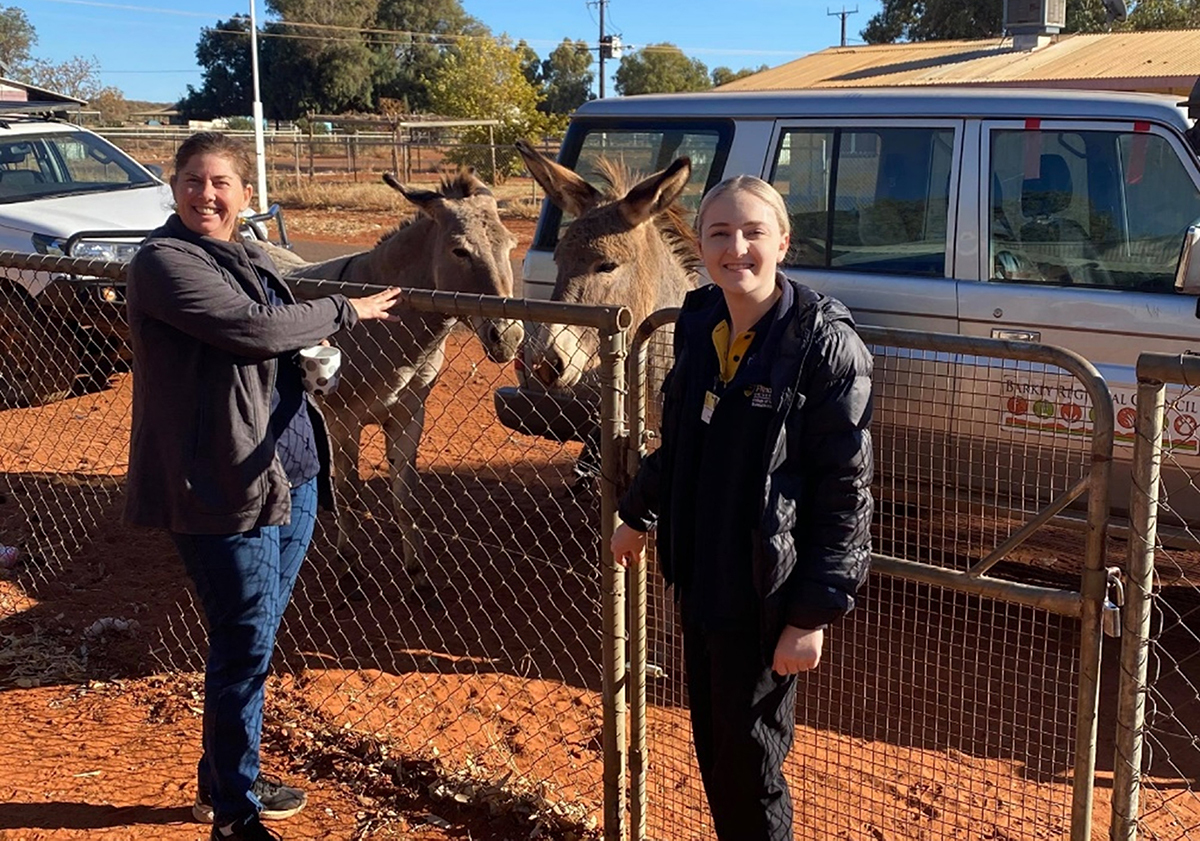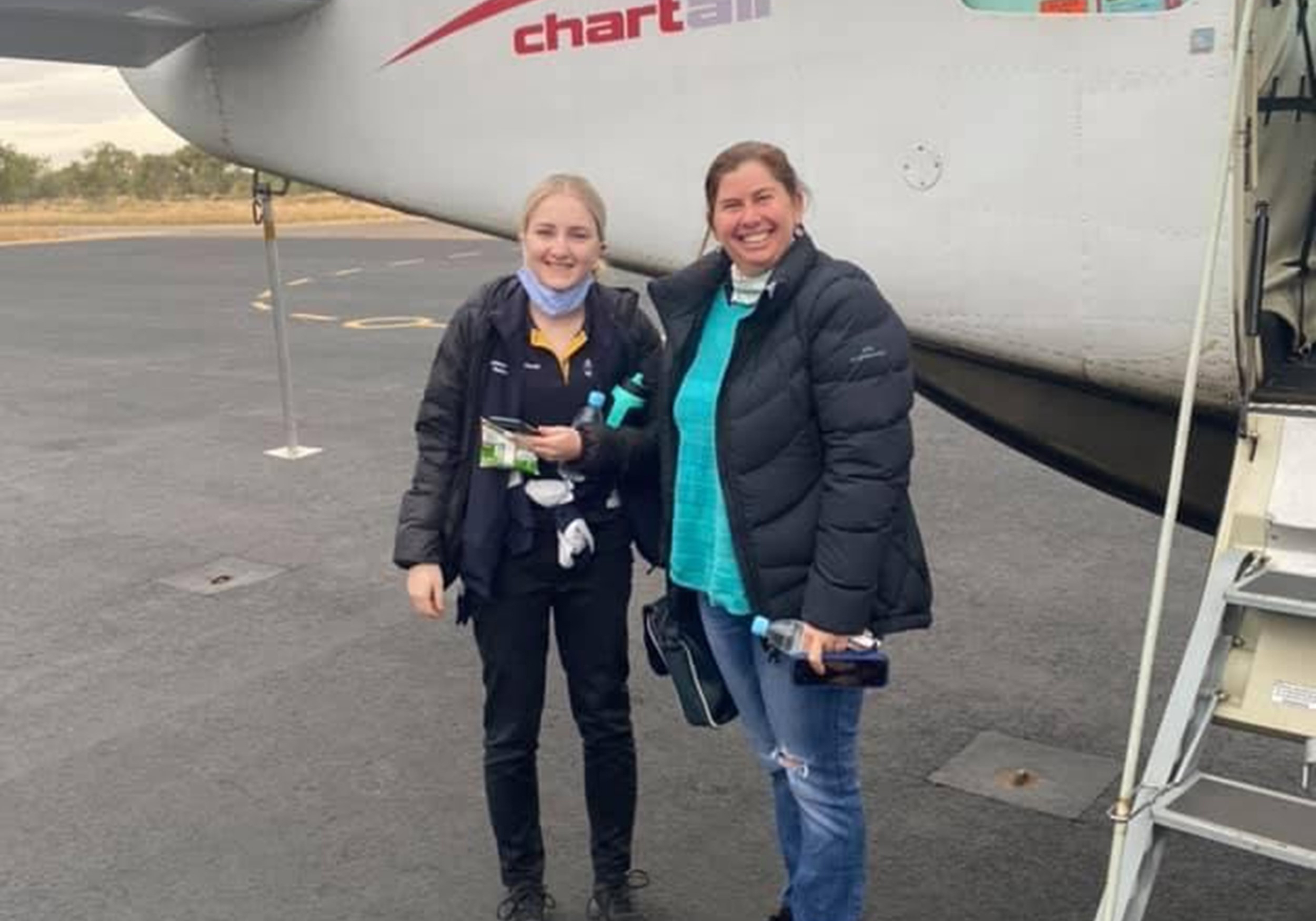This site may not work properly using older versions of Edge and Internet Explorer. You should upgrade your browser to the latest Chrome, Firefox, Edge, Safari, or any other modern browser of your choice. Click here for more information.
Your Stories
This is where we tell your stories, cover topical issues and promote meaningful initiatives.
Occupational therapy in the Red Centre
Jordyn Iovino reflects on her clinical placement with Desert Therapy in Alice Springs and discusses how she has grown as a professional through increased cultural awareness.
Prior to beginning my Masters of Occupational Therapy degree, I researched the vast experiences that Flinders University offered through their placements. When I heard about the possibility of being able to perform a placement in the Northern Territory with Desert Therapy, I immediately signed my name up and consistently approached my topic coordinators to ask them to consider me for this placement.
Having grown up in the Riverland, I understood the ways of rural community life and the close relationships which tend to form in these smaller towns. After moving to Adelaide in my late teens, I knew that I wanted to return to a rural placement and be able to provide much-needed healthcare to rural and remote communities.
Fortunately enough, I was offered the placement with Desert Therapy in Alice Springs. This clinic works with those funded by the NDIS scheme or My Aged Care, from paediatric through to aged care clients. The well-equipped, highly knowledgeable and friendly team are made up of a range of occupational therapists, speech pathologists and physiotherapists.
The multidisciplinary team was highly supportive and encouraging towards furthering not only my professional knowledge, but my knowledge of Indigenous culture. A key learning experience throughout this placement came about when I attended the Introduction to Central Australian Aboriginal Culture and Context Day, run by the Centre for Remote Health. This was pivotal in developing my cultural awareness and my ability to practise cultural safety for the remainder of my placement.
I learnt about the dynamic historical structures that form Aboriginal cultures and gained an understanding of the factors in rural or remote communities that influence Aboriginal health. This day also allowed me to interact and socialise with many other students from other disciplines who were on placement in Alice Springs. Thankfully, due to this workshop, I was then able to attend events around Alice Springs, travel to the West MacDonnell Ranges and Uluru together with these students.
What drew me to this particular placement was the vast range of clients and opportunities to provide care, not only within Alice Springs but also in very remote communities.
This was something I had never experienced and would have never experienced without the opportunity provided at Desert Therapy.
During our ‘bush block’ the Desert Therapy team would split up to visit their allocated communities. I was fortunate enough to fly with my supervisors to Wingellina (WA Border), which meant flying over the top of Uluru and Kata Tjuta! Here I spent a week with the team living at a miner’s camp and travelling to various communities around the WA/SA border.
Following this, we repacked the cars and drove through many dirt roads to Ampilatwaja, north of Alice Springs, where we spent the week visiting clients in the surrounding communities. I was also able to travel to the Desert Therapy’s Tennant Creek clinic and provide occupational therapy services in a smaller remote town.
During the remote visits I worked with a range of clients, and in the process developed many new skills, in particular my ability to recognise the importance of Indigenous culture and adapt my practice to be more culturally aware. Working in these remote communities was completely eye-opening and a pivotal learning experience which I would not have had if it weren’t for the support of the Desert Therapy team.
After three weeks visiting remote communities, we returned to the town clinic, where I was able to extend on the skills I had learnt out bush.
Returning to the town truly highlighted to me the significant demand and need for specialised health care services in remote communities.
This experience has helped me develop my culturally responsive communication skills and practice quite significantly. Due to the constantly changing environments and fast-paced sessions, I was able to utilise the knowledge of other multi- disciplinary team members to collaboratively develop reports and formalise clinical reasoning, quickly and for very remote clients.
Another key opportunity during placement was being able to connect with other OT students from Coffs Harbour. Together, we were able to have student-led debrief sessions after visiting some of these remote communities, and ask each other questions about how to word reports or perform certain assessments.
In long-winded summary, all these experiences have shaped who I am as an occupational therapist today, and given me skills which I may not have gained in Adelaide. The lifestyle in Alice Springs is flexible and more relaxed, which is something I was not used to and this put me out of my ‘highly-organised’ comfort zone.
However, being on placement at Desert Therapy allowed me to embrace the flexible work, especially as I found that when you visit remote communities you spend time trying to locate clients and have no set schedule.
So, for someone who is used to a very structured and organised schedule, I highly recommend undertaking this experience, at Desert Therapy or with a similar organisation.
It pushes you to not be so rigid in your OT practice and to involve yourself in the remote community lifestyle. I hope that upon finishing my degree this year, I can return to provide more healthcare to these remote communities, and return to Alice Springs!
Have a story of your own to share? Contact us.

